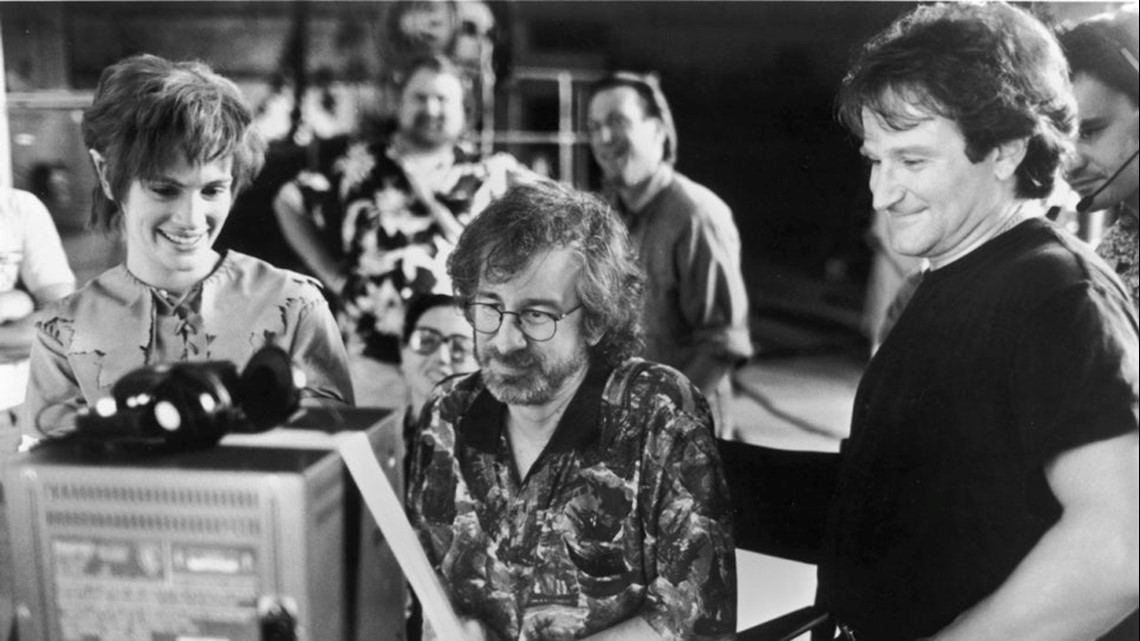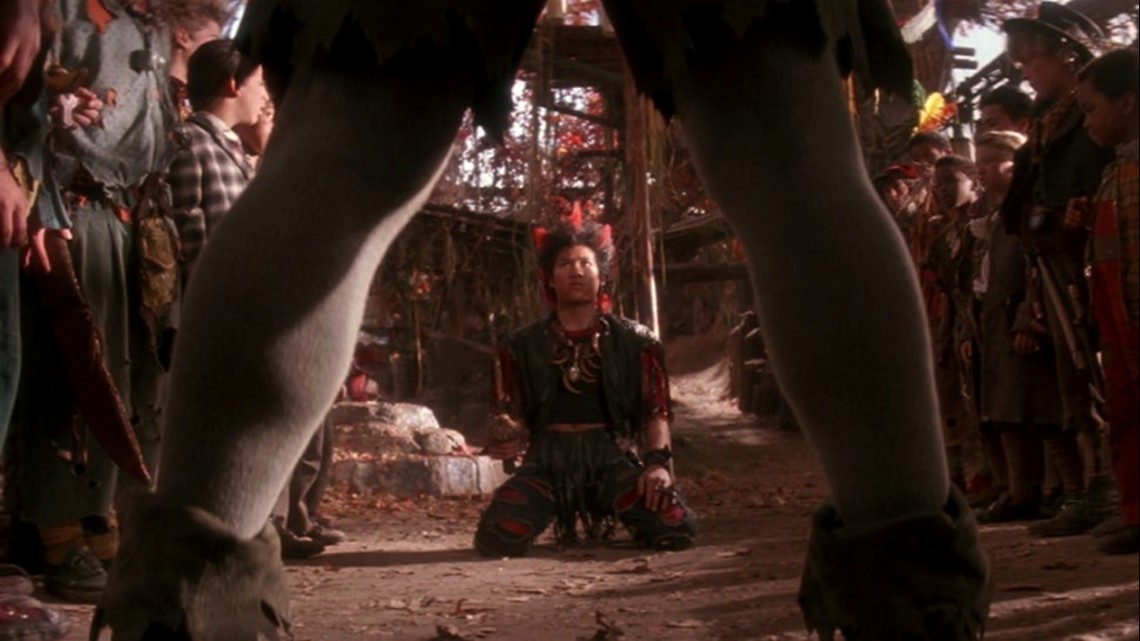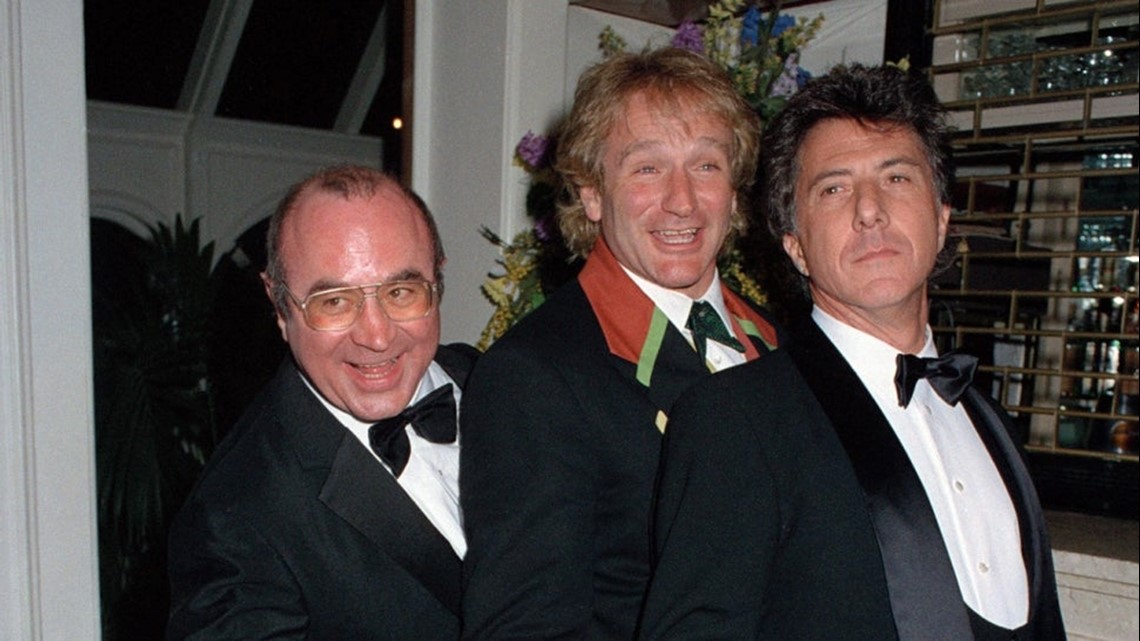Thirty years before Steven Spielbergchecked off reimagining West Side Story on his filmography to-do list, he chose to revisit family-friendly stories with Hook. Robin Williams, Julia Roberts and Dustin Hoffman helped the celebrated director fulfill his longtime ambition of taking on J.M. Barrie’s classic story about the boy who never had to grow up.
When speaking with ET in 1991 upon the movie’s release, Spielberg opened up about making Hook and how being a father was influencing his career. Choosing what movies to direct is not only selecting a story to dedicate at least a year of one’s professional life to, but for the filmmaker at the time, already a Hollywood legend following Jaws andE.T. - the Extra-Terrestrial, the decision took into account the big picture of his big-screen legacy.
“I looked way back and said, 'When was the last time I made a film that everybody could go see?' The grandparents. The little kids. The mom and dad. Teenagers,” Spielberg said. “And I guess the last time that happened for me, in terms of at least a film that was successful, was E.T. I'm not saying this is in comparison to E.T. at all, in any case, but just that I hadn't made a family film for like 10 years.”


Although, in the decade since E.T.’s phenomenal box office success, Spielberg didn’t completely leave family-friendly movies behind. Through his production company, Amblin Entertainment, he produced Gremlins, The Goonies, the Back to the Future series and An American Tale to name a few. “It was a nice feeling going back to something that had a little something for everybody,” Spielberg said. “I'm just happy that I'm able to, every once in a while, experiment. Go out and make a movie out of character. And really learn something from that experience. Then come back and find something else a little more in character.”
Despite wanting to do an adaptation of the story for years leading up to Hook, he remained hesitant until the right take came along. “I saw the play. I saw the cartoon. I saw the great Mary Martin TV presentation. And I just didn't want to be the fourth Peter Pan version,” Spielberg said. It wasn’t until screenwriter James Hart presented a concise logline that encapsulated a brand new spin on the story: What if Peter Pan grew up? “It just got to me. I said this is a really good idea for a twist on the Peter Pan legacy,” he said.


As both a sequel and reimagining, Hook took a two-pronged approach to adapting the literary classic. Peter Pan is now an adult named Peter Banning, who's forgotten all about his past as leader of the Lost Boys in Neverland and defeating Captain Hook. He's an uninspired father and a workaholic whose imagination only stretches far enough to do Old West showdown bits with his cell phone. But after his children are kidnapped by the infamous captain, grown-up Wendy Darling (Maggie Smith) and Tinkerbell (Roberts) break the news to Peter that he used to be the real-life green tights-wearing hero.
In reaction to popularly being called a grown-up Peter Pan type himself, Spielberg clarified while that’s true in a sense, it also extended to the character’s portrayal in act one of Hook. “I think part of me is [Peter Pan] and I think part of me is Peter Banning, as well. Part of me is the humorless character Robin plays in the first part of this story,” he admitted.
In order to rescue the children, Peter must "remember" his Pan era and the magic that came with it. For this, he needs the Lost Boys. Spielberg revealed that wrangling the nearly three dozen child actors on the set was easier said than done, saying he felt more like a “school teacher” than director at times.


“The first day of shooting, they all wanted to know their names. I had only named seven Lost Boys,” Spielberg recalled, explaining that he had to “name something like 28 kids in the first hour” of production. As he remembered, some of the kids were even “close to tears” until their characters were finally named.
Despite the unexpected tasks yielded from working with the young actors, Spielberg recognized how a little communication can go a long way with children. “I keep saying that what kids want more than anything else is to be listened to. If they have ideas, adults usually have a tough time listening to kids,” he explained. “They give them a pat on the head. They don't hear the words. The kids get it out and the adults say, 'That's nice, Joey.' And they walk away. Kids want to be heard.”
Spielberg also took a moment to highlight fond recollections of going to the movie theater with his family. It’s an experience that’s likely to be portrayed in The Fabelmans, his next directorial outing that’s described as a semi-autobiographical look at the director’s formative years as an aspiring filmmaker growing up in Arizona. “It's a great occasion to get the family together. I've had my best memories going out to the movies with my sisters and my parents when we were growing up. I remember that like it was yesterday, actually.”


In spite of Hook’s mixed reviews upon its release, the movie was technically a box office success and has gained a cult following since its premiere on Dec. 11, 1991. The film’s newfound popularity comes by way of a hindsight appreciation for how the writing and production took big swing after big swing, as well as the universal theme at its core that Spielberg was embracing more than ever amid fatherhood.
“It's a cliche to hear anybody say, 'This is a movie about the child in all of us.' We've heard that a thousand times ad nauseam, but it's true,” he said. “The reason we've heard it a thousand times is, because it is so true. Everybody has a child inside them and some of us [want to] deny it. And some others embrace it… I’ve found as my family has grown -- the more carpet time I spend with the action figures, and the paint sets, and the blocks, and that kind of thing -- you can't ever grow up.”
Spielberg concluded, “You'll always be Peter Pan when you've got kids of your own.”
Hook is streaming on Amazon Prime Video.
Watch the Lost Boy actors reunite and reminisce about Robin Williams in the video below!



